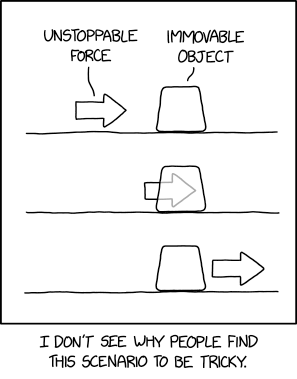this post was submitted on 02 May 2025
836 points (98.5% liked)
xkcd
10755 readers
403 users here now
A community for a webcomic of romance, sarcasm, math, and language.
founded 2 years ago
MODERATORS
you are viewing a single comment's thread
view the rest of the comments
view the rest of the comments

When you jump you are pushing the earth away from yourself a little bit, and then some of your gravity pulls the earth back toward you. You have moved the earth, and for a brief moment your jump has in fact altered Earth's orbit.
Relative to the sun, which is the next center of gravity. As you go up the chain you end up with the heaviest object which you cannot move relative to anything, as it is the logical point of relative movement for everything else.
Not relative to the sun, relative to momentum. Changes in the magnitude or direction of velocity are objective, not relative. These translate to real changes in momentum, from any reference frame. A real change in momentum is imparted upon the Earth roughly equal to your velocity relative to the earth multiplied by your mass at the moment your contact with the Earth ceases.
ETA: I do actually agree with your salient point above: that lifting an object is relative to a given "down", and so it is meaningless to expect to be able to "lift" the most massive object in the universe.
You need to be thinking about n-body physics though, everything affects everything. If the earth moves, that moves the sun a little, if the sun moves, that moves the local cluster a little, etc. Why wouldn't that affect this heaviest object?
I mean, are you suggesting that this heaviest object is simply the center of the universe and that all coordinates are defined around it? Because while that seems practical, I don't think it's how matter and space interact.
The universe is expanding everywhere all at once in all directions. So space itself is "moving". It is impossible to define movement except relative to another object made from matter.
Ok, I think we're on the same page here. But I'm still not sure about one of your previous comments, you suggested that this "heaviest object" can't move because it would be the logical reference to which any other body is measured.
But I want to think about that a bit. Let's say this heaviest object (HO) has something orbiting it and we're looking at it from earth with a telescope. As the smaller body orbits, we would probably see this HO wobble, right? Meaning that even if it's the most massive thing around, it's still affected by other objects, it can be moved.
That is a good question. I have to think about it.